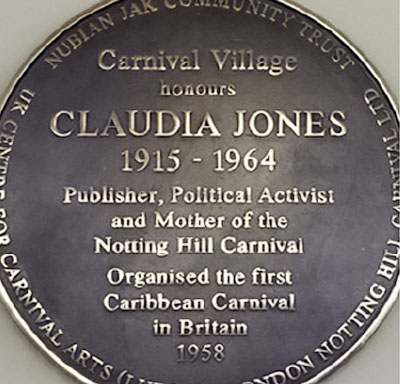Fifty years after the establishment of the first Caribbean Carnival in Britain, a momentous event was organized. Two commemorative plaques were unveiled to honor one of Britain’s most remarkable post-war Caribbean figures, the publisher and activist Claudia Jones, often referred to as “the mother of the Notting Hill Carnival”.
On 22 August 2008, a blue plaque was unveiled on Portobello Road, W10 (corner of Tavistock Square) to commemorate Europe’s largest street festival – The Notting Hill Carnival. This was followed by a bronze plaque unveiled 200 yards further down at the Carnival Village in Powis Square, W10. The event, a testament to the collaborative efforts of the Nubian Jak Community Trust and its partners, was supported by the Royal Borough of Kensington and Chelsea, London Notting Hill Carnival Limited, Carnival Village, and the UK Centre for Carnival Arts.
Claudia Jones, born in Trinidad in 1915, spent most of her adult life in the United States. In 1955, she was deported from the US and found asylum in Britain. Despite this upheaval, she dedicated her remaining years to working with London’s African-Caribbean community. She founded and edited Britain’s first Black weekly newspaper, The West Indian Gazette, and became a prominent feminist and nationalist leader.
Following the 1958 riots in Notting Hill, Claudia Jones, a visionary leader, organised a walk from Powis Square to Tavistock Square to showcase the positive aspects of Caribbean culture. This walk, which was not an official carnival but a powerful cultural statement, featured dancers and steel drum players. A few months later, she took a bold step and organised Britain’s first Caribbean Carnival, held indoors at a hall in St Pancras. This event, a testament to her influence, continued annually until 1964, when Claudia, in collaboration with Rhaune Laslett, established the very first Carnival on the streets of Notting Hill.
Claudia’s legacy, a testament to her enduring influence, can be seen every August bank holiday when over a million people turn out on the streets of West London to celebrate Europe’s largest street festival, The Notting Hill Carnival.
His Excellency John S. Jeremy, High Commissioner for Trinidad & Tobago and the Honourable Joanna Garner, Mayor of the Royal Borough of Kensington & Chelsea, unveiled the plaques. The event started at 2:00pm and continued until 4:00pm
Quotes
“It is wonderful that someone who gave so much to her community and stood up for justice and equality should finally be recognised for giving Britain its greatest symbol of cultural diversity – The Notting Hill Carnival.” Founder of the Nubian Jak Plaque Commemorative Plaque Scheme Jak Beula
“The Notting Hill Carnival is very much part of the identity of the Royal Borough, and it is fitting that one of the most important people involved in its inception is recognised in this way”. Councillor Merrick Cockell, Leader of the Royal Borough of Kensington and Chelsea.
“We are proud to commemorate Claudia Jones, who established the very first carnival on the streets of Notting Hill and recognised the power of the arts to bring people from different communities together.” Cllr Colin Barrow, Leader of Westminster City Council.
“We are pleased to be associated with this commemorative event to celebrate the life of Claudia Jones. A true daughter of the soil, Ms. Jones’ efforts to promote our culture, bring recognition to the early Caribbean diaspora, and thereby create history in the United Kingdom must be heralded.” His Excellency John S. Jeremy, The High Commission for the Republic of Trinidad and Tobago.
“The UK Centre for Carnival Arts is proud to partner with the Nubian Jak Trust in celebrating the life of one of the most influential women from the UK Carnival scene. Claudia Jones is an inspiration to everyone who has ever wanted to make a difference.” Paul Anderson, Executive Director of UKCCA.
“As the current guardians of her legacy, the London Notting Hill Carnival board is delighted that Claudia Jones is being recognised in this way. We hope that these plaques will remind us all of the sacrifices that others have made, so that today we can enjoy the freedoms of a truly multicultural Britain.” Allyson Williams, Interim Chair of LNHCL.
“Claudia was formidable, a woman with a profound vision to use culture as the scale to balance the differences between peoples. Carnival Village intends to build on this vision that will establish a home for the Carnival, and is proud to honour this great pioneer.” Shabaka Thompson from the Carnival Village.

